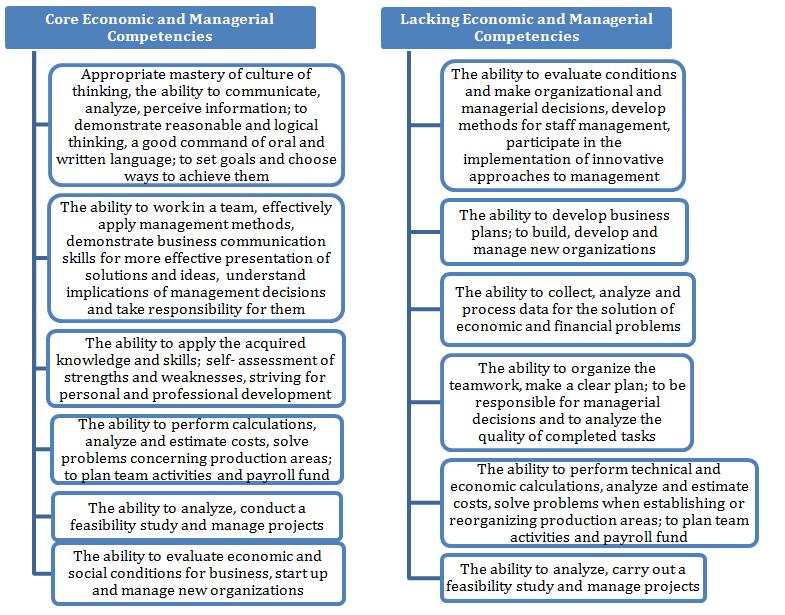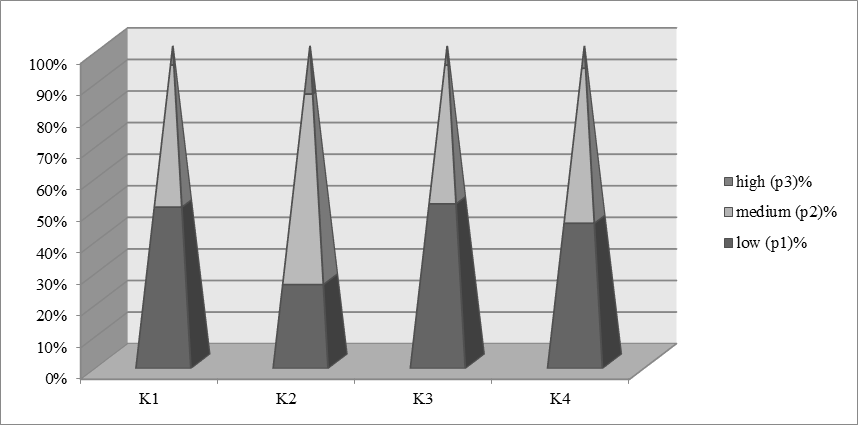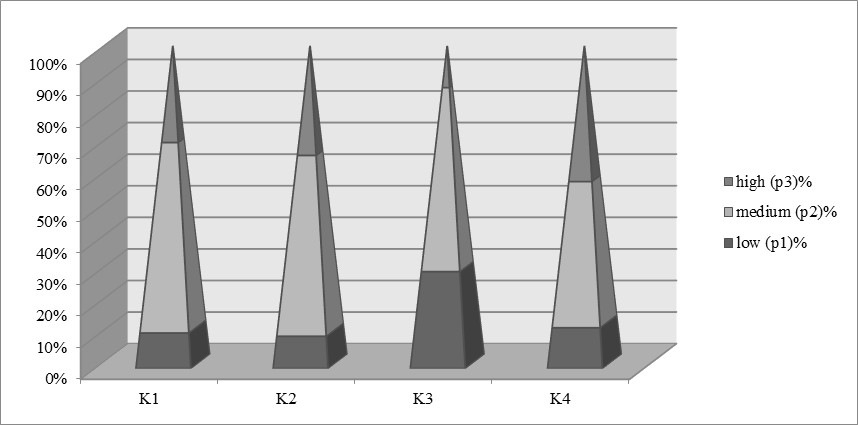Abstract
The paper deals with problems relating to orientation of the market economy with reference to development of economic and managerial competencies by bachelors after graduating from engineering higher schools to meet employers’ requirements, through implementing the Federal State Education Standards (FSES) of the third generation. The case study: training programs for the bachelor’s degree in Mechanical Engineering at Yurga Institute of Technology (Affiliate) of National Research Tomsk Polytechnic University. The list of economic and managerial competencies for bachelors in mechanical engineering is specified according to the third generation FSES, with its enlarging with new competences based on surveys and analyses after questioning employers; criteria and indicators are described to identify maturity levels in terms of economic and managerial competencies for bachelors in socially oriented market environments; a structural and functional model for training mechanical engineering bachelors has been tested in the implementation of the bachelor’s degree courses in "Mechanical engineering" at Yurga Institute of Technology (Affiliate) of National Research Tomsk Polytechnic University, commencing 2011 to 2015.
Keywords: Bachelormechanical engineeringemployersmarketmarket economyengineering universitiesthe model for developing economic and managerial competenciesFSES of the third generationcriteria and indicatorsevaluation
Introduction
According to the researches of leading scientists J. Malmqvist, I.V. Bogdanov and V. Zakharov the task of training mechanical engineering bachelors is to prepare graduates for successful and effective professional activity, and thus to form their economic and managerial skills. To increase students’ productivity, entrepreneurship and leadership required by the increasing technological complexity of objects, processes and systems there must corresponding essential skills, knowledge and personal qualities be being formed and developed on the basis of the professional educational institutions. This fact is believed to justify the urgent need to modernize the list of competencies, content, ways and methods of their formation within the process of educating engineering bachelors.
We agree with the views of industry representatives who witnessed the period between the end of 1970 and the beginning of 1980, paid attention to the need of broad vision for potential improving the quality of economic and managerial skills of engineering schools graduates, focused on the development of personal and interpersonal qualities and management skills, creation of objects, processes and systems. If the above mentioned qualities and skills are not taken into account during bachelors’ preparation, the near future is likely to face an even greater shortage of qualified engineering personnel.
The future changes of the mechanical engineering industry are supported by emerging technologies, graduates from engineering bachelor programs at higher educational institutions are expected not only to perform activities and duties in the field of product research and development, project designing and final production but also to demonstrate organizational, economic and managerial skills. Only top-quality engineering education having provided bachelors with the relevant extra knowledge, abilities and skills in cooperation, economics and management makes them competitive in the world’s market and more economically and managerially competent, and thus they become able to effectively run a modern machine building enterprise in the modern market environment (Suzdalova, Politsinskaya, & Sushko, 2015). The comprehensive nature of scientific and technological progress is expressed in the fact that results of scientific and technical researches and developments cover all sectors of the economy, accompanied by the widespread introduction of innovative machinery, qualitatively new production technologies, automatic management processes, and causing problems arising with commercialization associated with scientific and technical developments. Developing and using innovations aiming at technological advances are a key issue in the program intended to modernize the Russian economy. In this connection, there is a need for a socially oriented graduate with highly developed economic and managerial competencies.
We concur with authors such as Joseph Schumpeter and Friedrich Hayek who formulated the qualities required by leader: leadership, organizational abilities, critical and practical orientation of thinking. Modern educational science studies leadership from the perspective of organizational behavior. This research is being conducted in many business and management schools, for example in the Sloan School of Management at the Massachusetts Institute of Technology (USA).
Having conducted the survey of employers’ attitudes (including the directors and executives of LLC “Yurginsky machine engineering plant”, OJSC “Anzheromash" and etc.) to the level of expertise achieved and demonstrated by graduates with mechanical engineering degrees, we found out that it is not always appropriate for the field tasks in the area of economics and management (Lizunkov, Minin, Malushko, & Medvedev, 2016). These results reveal the necessity to revise approaches to professional preparation of mechanical engineering bachelors in order to eliminate deficiencies relating to economic and management systems that do not allow graduates to efficiently use their competences in today's market.
Analysis of the world practice demonstrates practice-oriented approach as one of the most fruitful and effective ways to acquire abilities and skills concerning economics and management. It is widely applied and developed in the world's foremost universities, including the Massachusetts Institute of Technology (USA), the Royal Institute of Technology and Linköping University, Chalmers University of Technology (Sweden).
Materials and Methods
The engineering bachelors training objective is to prepare this university graduates for their active professional career, and thus to enable development of their economic and managerial competencies. Students’ acquiring relevant knowledge, abilities and personal qualities is essential to enhance working capacities, entrepreneurial and leadership abilities in the framework of advanced technological complexity of engineering, processing and producing (Malushko, 2012). This can prove the urgent need to update the list of competencies, content, ways and methods of their formation within the context of bachelor’s degree course in engineering education (Maletina, & Tsybaneva, 2015). Only market-oriented economic and managerial competences contribute to the socialization of graduates.
The competence-based approach is a significant shift towards the student-centered learning, with an attempt to move from differentiation in subjects to interdisciplinary integration. When using this approach, the quality of training and levels of expertise are described by a certain set of professional and general competences for bachelors (Chuchalin, 2009).
Many Russian universities and foreign educational institutions are searching for a way of improving engineering education with bachelor’s degree in mechanical engineering. One of this ways, aimed at improving the quality of mechanical engineering preparation in the socially-oriented market economy, has been designed in the context of the CDIO Initiative which was originally conceived at the Massachusetts Institute of Technology (USA) as the approach of Conceiving-Designing-Implementing-Operating real-world systems, processes and products on the international market, then acquired by several European universities, and integrated into professional educational curricular worldwide (Kjersdam, & Enemark, 2002). This given international project focuses on avoiding the dichotomy between theory and practice in mechanical engineering education (Malmqvist et al., 2006). It underlines the role of practice in technical education and introduces problem-based and project-oriented tasks into engineering training system (Lizunkov et al., 2015).
On the basis of CDIO concept curricular focuses on forming extra professional competencies in adjacent spheres such as economics and planning, management and design, psychology and entrepreneurship. This means that personal, interpersonal, economic and managerial competencies are unavoidable part of educating a modern engineer (Loshchilova et al., 2015). Within CDIO the social adaptation is paid much attention in the aspect of changing market conditions of today (Bankel et al., 2003).
To conduct the detailed analysis of the modern state of engineering education we questioned about a hundred of employers using the services of graduates from mechanical engineering faculties at different universities in Russia. This survey contained questions on the information from CDIO Syllabus which structure includes clear explanation of particular graduates’ competences which they must acquire as the positive outcome of their studies (Bankel et al., 2003). The graduates that were the object of assessing by the employers had quite the same level of economic and management training and were employed at Leningrad mechanical factory named after K. Libkhnet, LLC Yurginsky machine engineering plant, Mechanical plant No. 149, OJSC Kemerovo experimental mechanical repair plant, Production and Technical Enterprise URAL, Experimental machine building Plant and etc. The key competences which the graduates felt lack or abundance of are presented in the figure

It will be difficult for a future specialist to adapt to today's market without these new competencies (Lizunkov, & Sushko, 2014; Malushko, 2015). To assess the level of competencies development we introduced relevant criteria each of which could be checked with the following tools (Minin, & Lizunkov, 2015). Organizational and managerial abilities concerning professional decisions, staff, innovation implementation, conflict situations, quality evaluation are checked with the help of author test developed on the basis of diagnostic tests by T. Ehlers (motivation to succeed), T. Ehlers (motivation of avoiding failure), D. Marlowe, D. Crown (Minin, & Lizunkov, 2015). Technical skills and knowledge in economics including processing and analyzing specific information, performing calculations and analyzing costs, planning funds are investigated through solution of the technical and economic problems, calculation and analysis of the given economic indicators. Studying project skills required implementation of practical tasks or case studies. And the last group, entrepreneurial knowledge and skills, proposes developing a business plan which means assessing business environments, market opportunities, business ideas, business plans and organizations (Minin, & Lizunkov, 2014).
Results and discussion
Diagnostics is a tool for education quality management. Diagnostics of graduates’ competencies allows us to estimate their level, to identify deficiencies in the preparation of mechanical engineers and to make adjustments to the educational process. This problem is effectively solved through the implementation of dual-model of designing the process of forming competences under investigation. The investigation was held during the period between 2011 and 2015 on the example of bachelor academic programs in Mechanical Engineering at Yurga Institute of Technology (Affiliate) of Tomsk Polytechnic University. About 200 undergraduate bachelors participated in the study having been divided almost equally into 2 groups in advance: control group and experimental group.
Educating bachelors in engineering sphere in the control group was held in the traditional teaching way. While being taught bachelors under experiment referred to original tutorials and learning materials designed by the authors and were engaged into variable team activities and project work implying business planning and solving economic and managerial case studies (Lizunkov, & Minin, 2014). There was also applied the author's methodical maintenance of discipline teaching, providing for the above mentioned activities. The content and technology of discipline implementation aimed at engineering bachelor's readiness to fulfill the practical, economic and administrative functions.
Figure

We analyzed that about 26% of the experimental group (that is about 52 people) managed to increase the quality of their

This facilitated the development of
The only satisfactory results were demonstrated by the students in the aspect of
The highest indicators were achieved in the field of
The last criterion implies both economic and managerial skills which undergraduate bachelors acquire during studies in mechanical engineering; this includes communicative skills, teamwork capability, leadership qualities, processing and analyzing abilities in economics and management, evaluating and assessment of socio-economic business environments (Politsinsky et al., 2015). This increase in proficiency level of economic and managerial skills in mechanical engineering sphere shows that the tutorials, handbooks, teaching and learning materials and courseware, created by the authors for supporting undergraduates’ project and teamwork, turned out to be effective (Lizunkov, 2015).
Conclusion
Firstly, we should assume the lack of economic and managerial competencies of students doing their bachelor’s course in
Secondly, the main criteria for assessing the effectiveness of developing economic and managerial skills have been worked out by the authors to meet the needs of the socially-oriented market environment and professional society of employers: organizational and managerial abilities; technical skills and knowledge; project skills; entrepreneurial knowledge and skills, - together constituting professional competence model of mechanical engineering graduate able to perform the successful activity and carry out professional tasks.
Thirdly, the results of our research have stated that implication of the original learning tutorials and teaching courseware used for realization of bachelor’s degree in “Mechanical Engineering” at Yurga Institute of Technology (Affiliate) of Tomsk Polytechnic University (in 2011-2015) is absolutely effective at a higher educational institution.
References
- Babikova, А.V., Fedotova, А.Yu. & Shevchenko, I.К. (2011). Problems and future prospects of engineering education in innovation-oriented economy. Engineering Journal of Don, 16 (6), 195-204. (in Russian)
- Bankel, J., Berggren, K.-F., Blom, K., Crawley, E.F., Wiklund, I. & Östlund, S. (2003). The CDIO Syllabus: A comparative study of expected student proficiency. European Journal of Engineering Education, 28 (3), 297–315.
- Chuchalin, A.I. (2009). Levels of Competencies of Graduates Trained in Engineering Programs. Higher Education in Russia, 11, 3-13. (in Russian)
- Kjersdam, F. & Enemark, S. (2002). The Aalborg experiment: Implementation of problem based learning. Aalborg: Aalborg University Press.
- Lizunkov, V.G. (2015). Development of Economic and Managerial Competencies by Mechanical Engineering Bachelors. Ph.S. Thesis, Tomsk, 137 p. (in Russian)
- Lizunkov, V.G. & Minin, M.G. (2014) Analysis of approaches to address issues of pedagogy. Bulletin of V.P. Goryachkin Moscow State University of Agroengineering, 4, 35-38. (in Russian)
- Lizunkov, V.G., Marchuk, V.I. & Podzorova, E.A. (2015). Identification of Criteria, Features and Levels of Economic and Managerial Competencies Development for Bachelors in Mechanical Engineering. Procedia - Social and Behavioral Sciences, 206, 388-393.
- Lizunkov, V.G., Minin, M.G., Malushko, E.Y. & Medvedev V.E. (2016). Developing economic and managerial competencies of bachelors in mechanical engineering. SHS Web of Conferences, 28, 01063. Retrieved from http://www.shs-conferences.org/articles/shsconf/abs/2016/06/shsconf_rptss2016_01063/shsconf_rptss2016_01063.html
- Lizunkov, V.G., Sushko, A.V. (2014) Gap Analysis of economic and managerial skills in undergraduate engineering. Scientific Review, 10, 152-156.
- Loshchilova, M.A., Lizunkov, V.G. & Zavjyalova, A.V. (2015). Professional Training of Bachelors in Mechanical Engineering, Based on Networking Resources. Procedia - Social and Behavioral Sciences, 206, 399-405.
- Maletina, O.A. & Tsybaneva, V.A. (2015). Specificity of training students’ audition skills at non-linguistics specializations. Philology. Theory and Practice, 7-1 (49), 129 – 131.
- Malmqvist, J., Östlund, S. & Edström, K. (2006). Using integrated program descriptions to support a CDIO programme design process. World Transactions on Engineering and Technology Education, 5 (2), 259–262.
- Malushko, E.YU. (2012). Profile teaching foreign languages in the podosphere. Science Journal of the Volgograd State University. Young scientists’ research, 10, 126-129.
- Malushko, E.YU. (2015). Use of special virtual learning system for educating schoolchildren with disabilities. 2nd international multidisciplinary scientific conference on social sciences & arts SGEM 2015: conference proceedings. Book 1. Psycology & psychiatry, sociology & healthcare, education, 2, 1155-1160, Bulgary, Albena.
- Minin, M.G. & Lizunkov, V.G. (2014). Development of models for the formation of economic and managerial skills bachelors engineering. Modern problems of science and education, 6, http://www.science-education.ru/120-16524, Accessed on June 22, 2016.
- Minin, M.G. & Lizunkov, V.G. (2015). On development of economic and managerial competencies by mechanical engineering bachelors. Higher Education in Russia, 6, 149-156. (in Russian)
- Politsinsky, E.V., Demenkova, L.G. & Medvedeva, O.V. (2015). Ways of students training aimed at analytical development while solving learning tasks. Procedia - Social and Behavioral Sciences, 206, 383-387.
- Suzdalova, M.A., Politsinskaya, E.V. & Sushko, A.V. (2015). About the problem of professional personnel shortage in mechanical engineering industry and ways of solving. Procedia - Social and Behavioral Sciences, 206, 394-398.
Copyright information

This work is licensed under a Creative Commons Attribution-NonCommercial-NoDerivatives 4.0 International License.
About this article
Publication Date
17 January 2017
Article Doi
eBook ISBN
978-1-80296-018-1
Publisher
Future Academy
Volume
19
Print ISBN (optional)
-
Edition Number
1st Edition
Pages
1-776
Subjects
Social welfare, social services, personal health, public health
Cite this article as:
Lizunkov, . G., Marchuk, V. I., Malushko, E. Y., Maletina, O. A., & Zav’yalova, A. V. (2017). Economical and Managerial Competencies of Bachelors in Mechanical Engineering. In F. Casati, G. А. Barysheva, & W. Krieger (Eds.), Lifelong Wellbeing in the World - WELLSO 2016, vol 19. European Proceedings of Social and Behavioural Sciences (pp. 456-463). Future Academy. https://doi.org/10.15405/epsbs.2017.01.62

